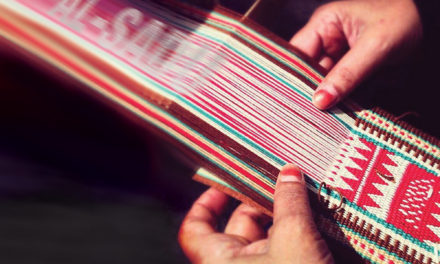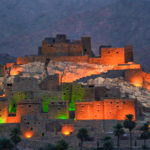By Khayriyah Ibrahim as-Saqqaf
The stage on which action began was at 450 Km., where the road is exploded by thorns. The period is between Wednesday, 19.5.1401 ad Wednesday 26.5.1401. The event is assassination.
The distance between moves was the bridge between my heart and theirs, between my soul and theirs. As I saw the bridge destroyed movement collided with empty space.
***
I was dreaming that my holiday would come on a spring-like day, when smiles and laughs, dew, rain, breezes, the flow of water, the murmurings of doves and all tenderness would converge in meaning and love. . .
Wednesday. How beautiful are Wednesdays, when joy comes to my heart like a bird that has flown for seven days and then landed in my hand. It comes like a legendary or mythical appointment with joy; it kisses me when I am thirsty for tenderness and hungry for a morsel of “I will see my mother and father for the weekend.” I will carry my books to them, and my rosy notebooks, and show them all I have learned. That is the meaning of Wednesdays.
I will tell them of my girl friends, Samar from Lebanon, Sahar from Egypt, Aisha from Malaysia, and Khadijah from Pakistan. I will tell them of their lives, their thoughts and their imaginings that float on the edges of clouds. I will tell about the faces of our teachers, full of their stories and titles, experiences and travels, knowledge and philosophy. I will describe the green vast spaces we imagine, our small, crowded, beautiful and safe world surrounded by its four grand walls that separate us from the external world.
Everything outside: that is the name of the big city in which sleep the rich and the poor, the famous and the unknown, and the schools, institutes, hospitals, monuments, and all the attractive shops. Noises come from every corner. We hear its sounds, smell its air and feel its climate along the road between our school and the airport, where we can glimpse its glittering streets from behind our veils. But when we read its newspapers and magazines, we do not find the city’s smells. Even television transmits only routine and unimportant things. We prefer to sit down to a cup of warm tea and talk about our teachers’ faces and the graffiti on our walls, and about Samar’s weekly letters from her fiancé. We do not even listen to the radio unless we want to know the number who have died in some battle or famine, or about the blood that has been shed somewhere since dawn.
But this Wednesday I decided to stay at school to study for the midyear exams. Oh, my mother, your face is illuminated, how I love that face! My eyelashes stand still in respectful love whenever I see you. My mother, your face is a mysterious world. And my father, my dear father. They say that men are strong, but I wish you were stronger in front of my mother. My heart beats. . .
In a moment, I was able to push away the notion of despair. I could see my parents in the next holiday, carrying the results of my exams. They would be proud, and forget that I was one whole week late. They would welcome me with kisses, and may be a bunch of roses? my success gifts.
Still, something mysterious whispered inside me, the familiar and the troublesome heartbeats of time, beating fear, caution, expectation, sadness, happiness, laughter, anxiety and contentment all at once. Days are stops, hours are alarms, and seconds are reminders. . .—of what?

“Raha!” said our dorm supervisor, “You must travel to your parents right away!”
My heart beat like a dove in one’s hands. “What happened” Is my father sick?”
“Oh, Raha, do not be fearful, he will be all right.” Those were the words I heard or thought I heard as the car sped to the airport. I did not see the city. I had left my room so quickly, grabbing only my black ‘aba’ah, that I left my books and notebooks. Even my written secrets lay unfolded in my room.
I imagined my father asleep on the bed. Oh, Allah, please, do not shock me, do not annihilate me! Would he be able to talk to me? How would I talk to him? Would he know me? Was it a traffic accident? How did he get sick on Wednesday? Or had he been sick for some time and not told me? Oh, my father, my world that I trust! Who would await me in the airport? In moments, I would know everything. We were landing, and time stretched, my steps became heavy, the space between the plane and my home became mountains on my feet.
And then truth committed suicide. Sweat covered my eyelids, forehead and fingers as I stared at him. There he was, my father, standing before me in full health, smiling to me, waiting for me. I had no voice; something whispered deep inside me, a dead body lay between his feet and mine, a silly lie.
Why did she lie? Dare she do that without being asked to? Who would tell her to lie? But then my heart pointed toward the sky to be forgiven for not trusting that faithful supervisor who took me to the plane with fear and love, praying with me for my father’s recovery. She believed the story. So who. . .
It was I who needed prayers.
The day passed in the anxiety of the secret of his life. Silence contained me. My mother’s fixed face did not attract my eyes. My father’s face contained nothing reassuring. My little brother was busier than usual. My house, the home that I counted the hours to come to, was saturated by cautious silence and suspense. What did they know? What were they hiding? Why the lie?
The fear was merely the announcement of what was coming. In the evening, my mother followed close to me and sat down near me, with words in her eyes that did not content me. My father sat near her, and my brother closed the door behind him, turned off the radio and sat down across the room. After some moments of terrible silence, my own voice cut its darkness and I begged, “What is wrong? Tell me; get me out of my fears!”
“There is nothing wrong, my daughter, it is a matter that might please you,” said my mother warily. My heart pounded to dizziness, there was something inside me. . . “We would like you to agree to marry,” she went on. “A man who has asked for your hand before. You wanted more time, more education and you have had it. We do not see any obstacle now. He will cherish you, and you will be happy.”
“Not that rich, old, fat Fahid?”
As I felt the sting of my mother’s hand across my cheek I saw that my father’s face was red. “You are arrogant! How dare you! We have made a match for you that every girl would envy! He is mature, he likes you, he will give you everything, and he will take care of you. How dare you be ungrateful?” my mother was shouting.
“Made it? You made the match already?” I looked at my father, who just nodded, looking hurt, and I remembered how it was last year, when I watched from my window when my uncle brought Fahid to our house, and how he looked at me when I helped serve dinner, and how I had nightmares of lying in his sweaty bed. But what objection could I make in my experience? I knew nothing evil of him. I had only begged for time, hoping that someone young, someone like the legendary Qais of Lila, or Khuthair of Amzah, or someone like the man Samar was going to marry, someone I could plan with, talk with, whose embrace I could long for, would ask for my hand.
“I can’t. I can’t!”
“What humiliation is this? What nonsense are you learning in that school? What will everyone say?”
“They’ll say that you loved somebody else,” taunted my little brother. “That you’ve been seeing men. May be that you’ve had an affair.”
“Say something to her!” my mother ordered my father.
“Don’t you trust us? When we have always wanted only what was best for you, and sent you to school as you wished? When you know how we love you?” He was almost crying.
“And, they’ll say that our father can’t control our daughter,” added my little brother.
“Don’t betray us,” my father pleaded. “Trust us. Trust us! Agree, go back for your examinations, finish the term, graduate and come back home to your wedding day. Be happy!”
“I can’t marry that man!”
“You will,” said my mother.
“I will not! Will you force me to death?”
“Death is simpler, if you insist on refusing.”
I ran to my room, crying. I could hear my brother’s door slam, hear my mother yelling her complaints to my father, hear her voice getting louder, and then she was in my room carrying a stick. She beat me until I crumpled on the floor and then she pulled my hair, the hair that she had taken such care of all my childhood, brushing it, shaping it, showing it off to her friends, calling it the waves and the ripples of a beautiful deep black river. Sixteen years of her fingerprints were on my hair.

I had thought that she wanted me to be beautiful among my friends. I did not know she was only preparing me for a sacrifice, like a herder who fattens and grooms his goat for sale. Again and again, she pulled my hair. My youth fell between her hands. My nose bled, her hands were wet with my blood, and I screamed in the fear of blood. I remembered the radio’s voice as my classmates and I listened, crying, because of the blood of war victims flowing on paved roads under neon lights.
My mother’s heart was the heart of a dumb hangman who has killed his feelings to do his job, a stupid hangman more attached to his full pocket than his heart. She was not my mother. This was a devil. She hardly resembled my mother. Was this another plot? The brainwashing they talked about?
The woman pushed me to the floor and left, slamming the door.
***
I cried until the pain and the fear solidified. Then I wiped my face, gathered my clothes, and braided a rope of my hair. I tried to tie it around my neck, but it would not strangle. My mother had given me life, she had given me death, but the death came too slowly.
In the next three days, I slept once and dreamed I’d had a nightmare, and my supervisor was waking me. . . I woke expecting my supervisor to be calling us, but it was only a sweet dream. No one visited me. I did not eat anything. I lay behind my door thinking of my school, my classmates, my teachers, my secrets in my notebooks, my secret dreams of love, secrets between myself and my pen, myself and the sky. Dreams as big as space—now reduced to nothing but soap foam, bubbles smashed by mother’s blows.
Oh, how great you are, Allah! You made my heart, feelings! No one can own another’s heart, you decreed it so! Even if my room is a locked jail, even if my parents are my jailors and my terror, my heart is still alive. My only escape is through Fahid’s bed, and I refuse it, refuse it! My heart is still alive!
I heard my father answer the telephone” “Raha is sick, she cannot study for a while, she must travel,” he lied. I wished I were deaf, or incapable of feeling. Tell them the truth; I screamed in silence, tell them that Raha is beaten, jailed, torn, bleeding and half her hair is sleeping on the floor!
I hear the key opening my door. Her face advances towards me. She plants her glare into me. She advances, I focus on her face. I feel that my eyes will explode. I don’t know in what wave I drowned.
*This story is part of a collection of short stories selected and translated by Heinrichsdorff and Abu Bakr Bagader under the title of “Modern Saudi Short Stories.”












